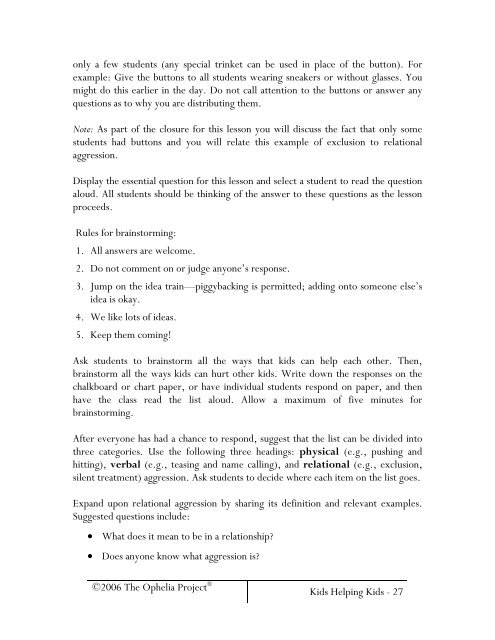Kids Helping Kids
KidsHelpingKids
KidsHelpingKids
- No tags were found...
You also want an ePaper? Increase the reach of your titles
YUMPU automatically turns print PDFs into web optimized ePapers that Google loves.
only a few students (any special trinket can be used in place of the button). For<br />
example: Give the buttons to all students wearing sneakers or without glasses. You<br />
might do this earlier in the day. Do not call attention to the buttons or answer any<br />
questions as to why you are distributing them.<br />
Note: As part of the closure for this lesson you will discuss the fact that only some<br />
students had buttons and you will relate this example of exclusion to relational<br />
aggression.<br />
Display the essential question for this lesson and select a student to read the question<br />
aloud. All students should be thinking of the answer to these questions as the lesson<br />
proceeds.<br />
Rules for brainstorming:<br />
1. All answers are welcome.<br />
2. Do not comment on or judge anyone’s response.<br />
3. Jump on the idea train—piggybacking is permitted; adding onto someone else’s<br />
idea is okay.<br />
4. We like lots of ideas.<br />
5. Keep them coming!<br />
Ask students to brainstorm all the ways that kids can help each other. Then,<br />
brainstorm all the ways kids can hurt other kids. Write down the responses on the<br />
chalkboard or chart paper, or have individual students respond on paper, and then<br />
have the class read the list aloud. Allow a maximum of five minutes for<br />
brainstorming.<br />
After everyone has had a chance to respond, suggest that the list can be divided into<br />
three categories. Use the following three headings: physical (e.g., pushing and<br />
hitting), verbal (e.g., teasing and name calling), and relational (e.g., exclusion,<br />
silent treatment) aggression. Ask students to decide where each item on the list goes.<br />
Expand upon relational aggression by sharing its definition and relevant examples.<br />
Suggested questions include:<br />
• What does it mean to be in a relationship?<br />
• Does anyone know what aggression is?<br />
©2006 The Ophelia Project ®<br />
<strong>Kids</strong> <strong>Helping</strong> <strong>Kids</strong> - 27


